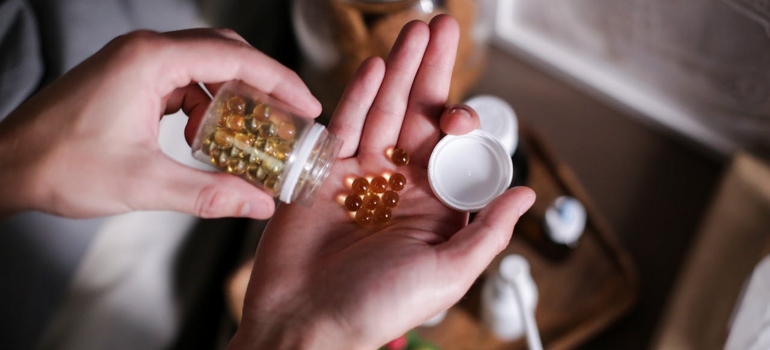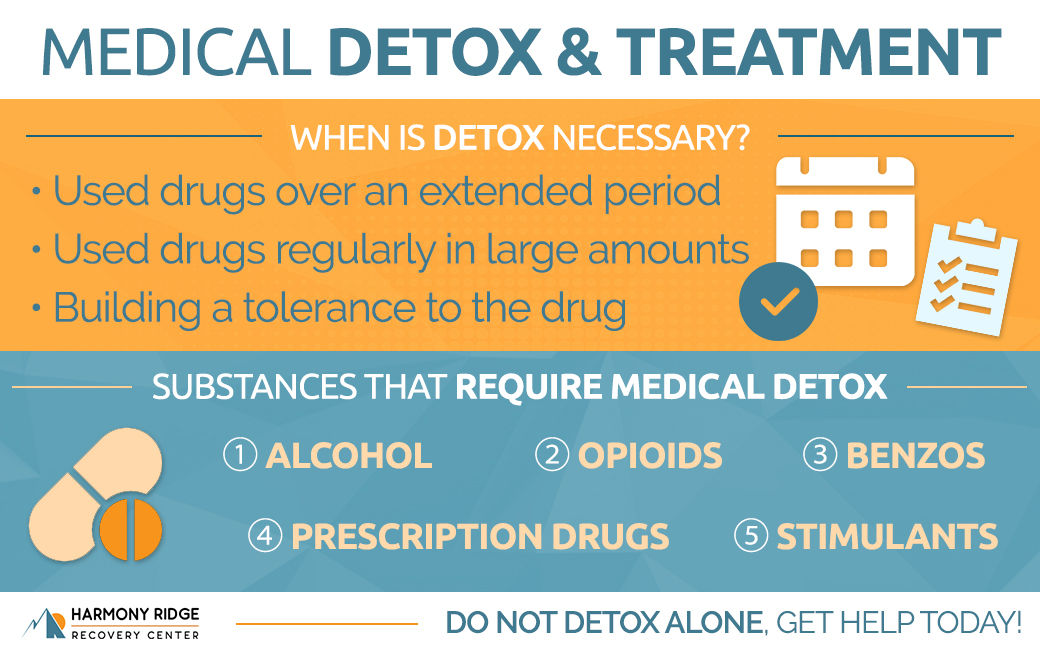Medical Detox & Treatment
Take the first step towards recovery and learn about medical drug detox – a crucial process of cleansing the body from toxic and addictive substances under professional supervision of the Harmony Ridge staff.
If you believe that you or a loved one has a drug or alcohol use issue, a medical detox program can help you secure a healthy lifestyle once again. Medical detoxification (detox) is a crucial first step in recovering from alcohol and drug addiction for individuals who show signs of physical and psychological dependence on these substances. Here at Harmony Ridge Recovery Center, we provide patients with detox programs that lay a foundation to build better and healthier habits. Learning about the characteristics of medical drug detox programs will allow you to find a plan that best fits your needs. Contact us today, and let us help you make the first step toward addiction-free life.

What is a Medical Drug or Alcohol Detox?
Medical detoxification refers to the cleansing of the body of toxic, addictive substances under the supervision of medical professionals. The medical team usually includes physicians, clinical staff, therapists, and nurses. Some detox centers will utilize advanced practice staff like physician assistants or nurse practitioners to deliver medical care during the detoxification process.
Most people understand the term “detox” to refer to a method of cleansing the body of toxic substances. But do you know what medical detox from drugs is and how it differs from our common understanding of the term detox?
Similar to asthma, diabetes, or rheumatoid arthritis, the disease of addiction is a common condition, too, and you can definitely control it. Medical detox center helps individuals who suffer from addiction. It does so in a similar way to a hospital emergency department to help people manage their long-term conditions. Medical detox for substance abuse will provide stabilization for an acute outbreak of the chronic disease. By itself, though, a detox will not change the long-term course of an addiction; people need addiction treatment for that.
For example, alcohol withdrawal can be life-threatening when severe, and medical alcohol detox is necessary. After a person treats their alcohol withdrawal symptoms, they should then attend alcohol rehab in WV. Similarly, medical drug detox is built for individuals who show signs of physical and psychological dependence on drugs. After completing detox from drugs, individuals receive drug addiction treatment.
Detox is the first step to treating substance addiction. Thus, detox will occur at the very beginning of the treatment. Individuals who complete drug or alcohol detox have a higher chance of staying in treatment for longer. Additionally, they are more likely to have longer periods of abstinence.
Contact Us TodayWhen is Medical Detox Necessary?
Individuals who deal with substance abuse and are at risk of becoming physically dependent on substances are top candidates for medically assisted detox. They will most likely suffer from physical dependence on substances if they have done the following things:
- Used substances over an extended period.
- Used substances regularly in large amounts.
- Required increasing amounts of substances to feel the usual effects.
- Tried quitting substances but were unable to without help.
- Had substance cravings frequently when not having access to it.
- Experienced diminished effect over time using the same amount of substance.

Individuals with substance addictions will usually receive drug detox treatment. They attend detox when they’re at risk of experiencing the effects of withdrawal from their substances of choice. Withdrawal happens when a person has become physically dependent on a substance.
Each substance has a characteristic pattern of drug or alcohol withdrawal symptoms. These drug or alcohol withdrawal symptoms are caused by chemical effects within the body and mind that come about when consumption of a substance is reduced or stopped altogether.
Substances that Require Medical Detox
Evaluation and treatment for potential withdrawal symptoms will be required during the addiction treatment to any of the substances listed below:
- Alcohol: Alcohol inhibits the activity of the central nervous system, which controls automated body functions like heart rate, blood pressure, body temperature, stress responses, and motor movements. Withdrawing from alcohol causes a rise in body temperature, blood pressure, anxiety, tremors, and heart rate, along with other symptoms of withdrawal. Therefore, alcohol rehab is usually necessary.
- Benzodiazepines: Also known as benzos, these drugs are sedative medications for treating anxiety and, in some cases, seizures. Benzos have a similar chemical effect on the body and the brain as alcohol does. Furthermore, both benzos and alcohol cause similar withdrawal symptoms, so Benzo rehab becomes a necessity.
- Opioids: Opioids are prescription medications and are primarily prescribed to treat pain. Taking them regularly will lead to a shutdown of endorphins, which will make the body resilient to the effects of opioid use. Although opioid withdrawal is not fatal on its own, it can be extremely uncomfortable.
- Prescription Drugs: Many prescription medications are misused purposely to feel relief from stress or pain. In addition to opioids and benzos, prescription drugs like sleeping medications and muscle relaxers can also be abused.
- Stimulants: Some more popular street drug stimulants are methamphetamine, MDMA, and cocaine. Although stimulants won’t produce life-threatening withdrawal symptoms, most stimulant users will become severely depressed once usage has stopped. In these cases, stimulants rehab is advised.
- Synthetic Drugs: The most popular and fatal synthetic drug is the prescription opioid fentanyl, which also creates significant withdrawal symptoms that fentanyl detox treatment can successfully handle.
Expectations of Medical Drug and Alcohol Detox
During medical drug detox, the medical staff will help customize each patient’s treatment plan to meet his or her individual needs. Prior to going through detox from drugs or alcohol, patients will undergo comprehensive evaluations to ensure that their needs are met. While this is in progress, clinicians will screen for the following things:
- Co-occurring disorders.
- Medical conditions.
- Drug and alcohol use disorders.
- Risk for withdrawal.
- Contributing psychological factors.
Once such evaluations are complete, the detox process begins.

Medications Used During Detox
During medically supervised detox treatment for drugs, patients will receive medications to reduce their withdrawal symptoms from drugs or alcohol and decrease their cravings. These medications are administered on a patient-by-patient basis under the supervision of clinicians and medical staff. Some of the withdrawal medications that medical detox patients most often use within a medical detox center include:
- Methadone: This drug is a fully active opioid that carries all the risks of an opioid; however, when monitored, methadone can be used as a highly effective way to prevent opioid withdrawal symptoms.
- Naltrexone: Used for the withdrawals caused by both alcohol and opioid use disorders, naltrexone will act as a long-acting opioid-blocking agent. To receive naltrexone during detox, the patient must have not used opioids for at least seven days.
- Vivitrol: This is a form of injectable withdrawal medication that is often utilized during treatment for alcohol and opioid use disorders. A patient can only receive Vivitrol once he or she has not used alcohol or opioids for at least 7 to 10 days.
- Suboxone: This prescription drug is equally effective as methadone and treats withdrawal symptoms. Its active ingredient, buprenorphine, is an activator of the opioid receptors but carries less addiction and overdose risk than methadone.
- Sublocade: This prescription drug is a long-acting injectable form of buprenorphine. Sublocade’s form of administration will help limit the risk of abuse. It is necessary to understand that Sublocade can only be administered to patients who have already received several doses of Suboxone for at least seven days.
Length of Medical Detox Process
The length of time that a substance user will need to medically detox from drugs, along with the intensity of detox that a substance user will need to receive, will depend on the following factors:
- Type of substance used: The type of substance that a person with addiction uses will determine how severe their withdrawal symptoms will be. For instance, you can feel alcohol withdrawal in just a few hours after the last drink, sometimes requiring the patient to take a dose of substitute medication for a few days.
- Duration and frequency of use: The longer a substance user has taken the substance, the more likely that he or she will develop a physical dependence on his or her substance of choice. Similarly, the more substances a person uses and the longer the period of time that he or she uses those substances, the more likely that person will become physically dependent on the substances.

Additional Factors That Impact Medical Detox Length
- Amount of substance used: A larger amount of substance abuse will usually promote a faster tolerance. Also, the more substances a person uses, the more that person’s body will likely need to take drastic measures to acclimate itself to the substance intake. As a result, individuals who consume more substances will develop a higher tolerance to those substances. Such development of a higher tolerance will then require such individuals to consume even more substances to feel their effects.
- Individual factors: A substance user’s personal weight, body chemistry, metabolic rate, and genetics will all impact the length of time that he or she will need to medically detox from drugs. All of these individual factors will also impact how intense a substance user’s withdrawal symptoms will likely be and, thus, the level of intensity of drug detox that a person will need to receive.
Although each detox patient’s timetable to fully cleanse will vary, the usual detox will last 5 to 7 days.
Safety of a Medical Detox vs. Detox at Home
Detoxing alone at home could be fatal. This is due to the possibility of needing medical attention during detox because of matters such as losing one’s consciousness or experiencing seizures. Thus, detox should always be supervised by medical professionals at medical detox center or rehab center that offers detox services.
Once an individual experiences withdrawal from substance abuse, detox will be a priority to eliminate substances from the body effectively. A physician with a medical team of nurses and clinical staff will supervise each level of medical detox treatment for drugs. All such medical team/clinical staff members are usually trained in addiction treatment.
For most substances, the withdrawal process will cause fluctuation in a person’s blood pressure, heart rate, and temperature. Thus, physicians and medical staff will closely monitor the vital signs of individuals during supervised detox.
Physicians and medical staff will also provide prescription withdrawal medications. The purpose of prescription withdrawal medications is to ease the pain that comes from substance withdrawal during detox. Medical supervision’s main purpose is to ensure that every detox patient is taken care of if something goes wrong.

Next Steps After Detox
After completing supervised detox and residential treatment, most patients continue to receive a partial hospitalization program in West Virginia (PHP).
While the detox addresses only the physical consequences of substance use, efficient alcohol and drug rehab programs will address both the physical and psychological nature of addiction. Detox alone can’t alter the natural course of a person’s substance addiction; it works only as an introduction to addiction treatment.
Detox patients can also choose to go through an inpatient drug rehab in WV. The ideal addiction treatment program that occurs after detox will address the underlying spiritual, emotional, mental, and behavioral causes of addiction.
Co-Occurring Disorders Treatment Post-Detox
A co-occurring disorder is when an individual simultaneously suffers from two types of disorders. Individuals with co-occurring disorders often struggle with substance abuse and mental health disorders at the same time. At Harmony Ridge Recovery Center, we make a conscious effort to offer various specialized treatment programs for co-occurring disorders. Our dual diagnosis treatment in West Virginia focuses on addressing both issues together. That is how we give individuals a better chance at lasting recovery.
Inpatient vs. Outpatient Treatment Post-Detox
Factors such as the substance that a person is addicted to and the severity of a person’s addiction will affect whether that person will attend an inpatient or outpatient form of addiction treatment after detox. The type and severity of the mental health issue that a person with a co-occurring substance use and mental health disorder suffers from may also affect whether a person will attend one or another.

There are many benefits of attending inpatient and outpatient forms of addiction treatment. Ultimately, both inpatient and outpatient forms of post-addiction treatment keep the focus on the goal of getting individuals to achieve and maintain sobriety.
Contact Us TodayMedical Detox Programs at Harmony Ridge
Harmony Ridge Recovery Center is a nationally recognized drug and alcohol detox center and treatment facility. It is also one of the top medical detox centers in WV. We provide a comfortable transition from addiction to sobriety in a caring and nurturing environment. Our team of dedicated medical professionals has helped countless individuals who struggle with drug abuse along with any co-occurring mental illnesses to achieve and maintain recovery. Contact us today to learn more about our detox and addiction treatment programs. We are awaiting your call!
Contact Harmony Ridge Today!
The first step toward achieving recovery is to reach out to one of the rehabs in WV that can get you on the track to recovery. Our admissions team is available 24 hours a day, 7 days a week, 365 days a year. Give us a call today!
Contact Us TodayFrequently Asked Questions
What is medical detox?
Medical detox is a supervised process of removing addictive substances from the body. At Harmony Ridge Recovery Center, a team of doctors, nurses, and clinical staff ensures safe withdrawal, helping stabilize individuals as they begin recovery.
When is medical detox necessary?
Medical detox is necessary when someone has developed a physical dependence on substances like alcohol, opioids, or stimulants. It’s especially helpful for individuals who struggle to stop using on their own due to cravings or withdrawal symptoms.
What Happens During an Assisted Medical Detox?
During a medical assisted alcohol detox, patients first undergo a thorough medical assessment. That is how we create a personalized detox plan based on their medical history and addiction details. As the substance levels in their body decrease, withdrawal symptoms may occur, varying in severity depending on factors like substance type, duration of use, and overall health. What does a detox facility do next? To manage these symptoms, controlled medications are provided to alleviate discomfort and support emotional well-being. Compassionate, 24/7 care ensures patients are monitored and supported throughout the process for the best outcomes.
What substances typically require medical detox?
Substances that commonly need a visit to a medical detox center include alcohol, benzodiazepines, opioids, and certain prescription drugs. These substances can cause severe withdrawal symptoms, making medical supervision critical for a safe detox process.
How Medication-Assisted Treatment Works
Medication-assisted treatment (MAT) uses FDA-approved medications like naltrexone and buprenorphine to ease withdrawal symptoms. But also to counteract the long-term effects of opioid abuse. These medications are prescribed in small, controlled doses, with options tailored to each patient’s needs. MAT is provided only for the necessary duration to help patients transition to a medication-free recovery. At Harmony Ridge, we aim to break the stigma surrounding MAT and emphasize its importance in supporting recovery. By managing the effects of opioids, MAT allows patients in West Virginia to focus fully on their healing journey. That’s how it increases their chances of achieving lasting sobriety.
What medications are used during medical detox?
During medical detox, medications like methadone, naltrexone, and Suboxone are used to ease withdrawal symptoms and reduce cravings. These medications are tailored to each person’s needs under close supervision.
How long does the detox process take?
The length of medical assisted alcohol detox varies. It’s determined by the type and amount of substance used, frequency of use, and individual factors like metabolism. Typically, detox lasts from 5 to 7 days, though some individuals may need more time.
Is detox alone enough for addiction recovery?
Detox is the first step in addiction recovery, but it’s not enough on its own. After detox, ongoing treatment, like inpatient or outpatient rehab, helps address the mental, emotional, and behavioral aspects of addiction for lasting recovery.
Why is medical detox safer than detoxing at home?
Detoxing at home can be dangerous due to severe withdrawal symptoms like seizures or blood pressure fluctuations. Medical detox at Harmony Ridge Recovery Center ensures round-the-clock supervision, keeping individuals safe and comfortable during this challenging process.
Is A Medication-Assisted Program Right For Me?
The decision to pursue a Medication-Assisted Treatment (MAT) program is deeply personal and guided by our medical staff’s expertise. To determine if MAT aligns with your needs, consider whether you’ve struggled with maintaining sobriety in abstinence-only programs or experienced relapses during or after treatment. MAT might be right for you if you’re open to using FDA-approved medications to reduce cravings while working toward long-term sobriety. Reflect on whether you’re committed to taking medications as prescribed to support your recovery goals. Understanding how MAT works can help you decide if it’s the right fit for your journey.
How Harmony Ridge Can Help with Medical Detox
At Harmony Ridge, we understand concerns about medication-assisted treatments (MAT) and their potential risks. Our certified and experienced staff ensures MAT is implemented safely and effectively. Offering an invaluable tool for managing addiction and withdrawal symptoms. If you or a loved one is struggling with substance addiction, we’re here to provide the guidance and care needed for recovery. Regaining control of your life often starts with professional substance abuse treatment. Contact our medical detox center today to begin your journey to healing and sobriety.
Jump To Section
Begin Your Journey to Healing Here
Ask me about recovery, I can help you!
Our recovery specialists are standing by 24/7 to help you or your loved one.
Or call us: 



